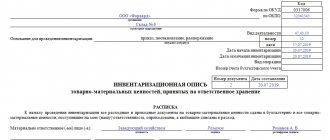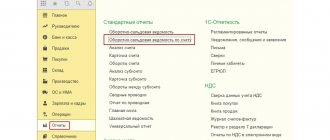Storage agreement
The storage agreement is concluded in writing (subclause 1, clause 1, article 161, clause 1, article 887 of the Civil Code of the Russian Federation). Organizations for which storage is a business activity (commodity warehouses), instead of concluding an agreement, can issue a simple (double) warehouse certificate, which indicates the conditions and storage period of goods and materials (Articles 887, 913, 917 of the Civil Code of the Russian Federation). If, within the period established by the agreement, the depositor does not pick up the goods and materials transferred for storage, the custodian has the right to sell them, having warned their owner about this (clause 2 of Article 899 of the Civil Code of the Russian Federation).
Typical mistakes when drawing up an act in form MX-1
During the preparation and use of the act of transfer for storage, a huge number of errors are often made. It is important to know which of them are the most common in order to prevent them from appearing on the record.
Mistake #1. Incorrect formatting of corrections
If errors occur when preparing primary documents, there is no need to completely redo them. It is enough to make correctly completed corrections.
Each of them must be done carefully and certified accordingly. To do this, next to the correction, the date of its entry into the document is indicated, as well as the signature, surname and initials of the persons who participated in the preparation of the document.
Receipt of inventory items for storage
Documentation of acceptance of inventory items for safekeeping depends on whether they were accepted under a storage agreement or not.
Under a storage agreement, the receipt of goods and materials from organizations and entrepreneurs must be formalized with a transfer and acceptance certificate in form No. MX-1. When returning inventory items to the depositor, a report is drawn up in form No. MX-3. In addition to the list of returned goods and materials, this act indicates the volume and cost of services provided by the custodian. Therefore, there is no need to prepare additional documents on the provision of storage-related services.
After receiving the goods and materials deposited for storage, the depositor must confirm the absence of claims against the custodian organization by signing the journal in Form No. MX-2.
This procedure is established by instructions approved by Resolution of the State Statistics Committee of Russia dated August 9, 1999 No. 66.
There is no unified form of document used to formalize the acceptance of goods and materials for storage from the public. Therefore, when providing storage services to the population, an organization can use standard forms No. MX-1, No. MX-2, No. MX-3 or similar documents developed independently: receipts, receipts, numbered tokens, etc. The issuance of any of these documents will be mean that the storage agreement is concluded in writing (clause 2 of article 887 of the Civil Code of the Russian Federation).
For other agreements (for example, sales and purchases with transfer of ownership after payment), the acceptance of inventory items for safekeeping is documented with invoices (for example, according to forms No. TORG-12, No. 1-T, No. M-15).
Stages of the procedure
An integrated approach involves the following actions:
- Unloading manually or using electric forklifts. Everything is done with care, since the integrity of the cargo is completely dependent on the receiving party.
- Acceptance. It consists of reconciling the actual quantity with the nomenclature and monitoring packaging and other characteristics.
- Placing and cataloging. Depending on the type of product, it can be placed in different ways on shelves and in containers. Information about the location in the warehouse must be entered into the file cabinet.
At this point, the service has not yet been fully provided; the transfer also needs to be completed. What does it mean to release inventory items from safekeeping:
- Drawing up an application from the owner, checking it.
- Equipment. If required during this stage, labeling, packaging and additional packaging activities are carried out.
- Preparing the batch for shipment - applying barcodes, preparing accompanying documentation.
- Loading. Transport, as a rule, is customized by the client himself. However, often this offer comes from logistics companies, so shipment smoothly flows into transportation.
If we consider not an agreement, but an obligation that arises between two parties to trade relations under Article 524 of the Civil Code of the Russian Federation, then there are somewhat fewer stages; they are, as a rule, limited to acceptance and unloading, placement, and then loading without additional manipulations with the cargo.
Accounting with the custodian
Inventory and materials accepted for storage are not the property of the custodian, therefore they are accounted for separately from his own property in off-balance sheet account 002 “Materials accepted for safekeeping” (clause 10 of the Guidelines approved by Order of the Ministry of Finance of Russia dated December 28, 2001 No. 119n ). Analytical accounting on this account is carried out by owners of inventory items, by grade and storage location (Instructions for the chart of accounts).
Receipt of inventory items for storage, as well as their return to the owner, is reflected with the following entries:
Debit 002
– goods and materials were received for safekeeping;
Credit 002
– goods and materials accepted for storage are returned.
Custodians (commodity warehouses) reflect income and expenses associated with the provision of storage services in accounting as income and expenses for ordinary activities (clause 5 of PBU 10/99, clause 5 of PBU 9/99).
Situation: is it necessary to reflect monthly revenue from the sale of storage services in the accounting of a custodian (warehouse). Is the storage agreement concluded for a period exceeding one month?
Answer: yes, it is necessary.
For custodians (commodity warehouses), revenue from the sale of storage services is income from ordinary activities (clause 5 of PBU 9/99). Revenue is taken into account in an amount equal to the amount of cash receipts and (or) the amount of accounts receivable (clause 6 of PBU 9/99).
Revenue is reflected in accounting if the following conditions are met:
– the organization has the right to receive it;
– the amount of revenue can be determined;
– the service is actually provided to the customer;
– the costs associated with the operation can be determined.
Such rules are established by paragraph 12 of PBU 9/99.
When providing storage services, all of the above conditions can be considered fulfilled on the last day of each month during the contract period. Moreover, the custodian has the right to receive remuneration, even if the storage agreement is terminated early (clause 3 of Article 896 of the Civil Code of the Russian Federation). Remuneration will also be received if the owner refuses the goods and materials transferred for storage. The custodian can sell such property (with notification to the owner) (clause 2 of article 899 of the Civil Code of the Russian Federation). Consequently, the custodian should reflect the revenue from the provision of services under a storage agreement in accounting based on the results of each reporting period, that is, monthly (clause 29 of the Regulations on Accounting and Reporting).
For organizations that have the right to conduct accounting in a simplified form, a special procedure for recording income and expenses is provided (Parts 4, 5, Article 6 of the Law of December 6, 2011 No. 402-FZ).
Who is comfortable using the service?
In addition to the above situations, you can sign a storage agreement with a third-party organization. Most often this opportunity is used:
- Logistics companies. They can effectively carry out freight transportation, store, manage traffic flows, but at the same time minimize the participation of their own premises and personnel.
- Companies that need to store property exclusively during certain seasons, and not year-round. Instead of maintaining their own warehouse, they can pay for services seasonally.
- In the absence of storage facilities. Sometimes you can completely refuse to purchase and service them by using the offer of third-party companies. This removes some of the responsibility and simplifies the work.
- When consolidating or packaging cargo. Companies offering return storage also carry out shipment, delivery of consignments, their assembly and disassembly.
- If there is a need for additional space for storing property.
In all of the above cases, it is recommended to use the services of specialized companies offering warehouses for storing your property.
Do you want to implement Warehouse 15? Get all the necessary information from a specialist.
Thank you!
Thank you, your application has been accepted!
Buyer's accounting
On off-balance sheet account 002, purchasing organizations reflect inventory items that were received:
- from the supplier and for which the buyer refused payment on a legal basis (inconsistency of the assortment, quantity or quality specified in the contract);
- under contracts providing for the transfer of ownership to the buyer only after payment (or other events).
In accounting, the movement of such inventory items is reflected by postings:
Debit 002
– goods and materials that are not subject to payment due to violation of the terms of the supply agreement are accepted for safekeeping;
Credit 002
– inventory items that are not payable and returned to the supplier are written off off-balance sheet;
Debit 002
– goods and materials that are not subject to expenditure (use) before payment are accepted for safekeeping (under an agreement with special conditions for the transfer of ownership);
Credit 002
– written off from off-balance sheet accounting due to the transfer of ownership to the buyer;
Debit 10 (08, 41…) Credit 60
– accepted on the balance sheet of goods and materials, the ownership of which has passed to the buyer.
Supplier organizations reflect on account 002 inventory items that became the property of the buyer, but were not removed from the supplier’s warehouse:
Debit 002
– goods and materials not removed by the buyer are accepted for safekeeping;
Credit 002
– inventory items left by the buyer for safekeeping are written off from off-balance sheet accounting.
This procedure follows from the provisions of the Instructions for the chart of accounts.
Inventory and materials recorded on account 002 in the listed cases are not received under a storage agreement. Consequently, it is not necessary to draw up documents on the acceptance and transfer of goods and materials according to forms No. MX-1, No. MX-2 and No. MX-3. This is explained by the fact that these documents are intended to formalize the transfer of inventory items under a storage agreement. And suppliers and buyers act within the framework of purchase and sale (supply) agreements. Therefore, in this case, when receiving and transferring goods and materials, fill out invoices (for example, according to forms No. TORG-12, No. 1-T, No. M-15).
An example of reflecting in accounting the acquisition of materials under a purchase and sale agreement with a special procedure for the transfer of ownership. Ownership of the shipped materials passes from the seller to the buyer only after payment.
Alpha LLC purchased materials worth RUB 118,000. (including VAT – 18,000 rubles). According to the terms of the agreement, ownership of the materials passes to Alpha only after payment. The materials were transferred to the buyer on October 18, and paid for on November 15. The materials are intended for conducting activities subject to VAT.
The following entries were made in Alpha's accounting:
October 18:
Debit 002 – 118,000 rub. – materials that are not subject to consumption before payment are accepted for safekeeping (at the cost indicated in the accompanying documents, including VAT).
15th of November:
Debit 60 Credit 51 – 118,000 rub. – money was transferred for materials received;
Loan 002 – 118,000 rub. – materials were written off from off-balance sheet accounting due to the transfer of ownership;
Debit 10 Credit 60 – 100,000 rub. (RUB 118,000 – RUB 18,000) – materials are taken into account as part of own working capital;
Debit 19 Credit 60 – 18,000 rub. – VAT on capitalized materials is allocated;
Debit 68 subaccount “Calculations for VAT” Credit 19 – 18,000 rub. – accepted for deduction of VAT on capitalized materials (based on the supplier’s invoice).
Attention: if the buyer stores inventory items for a long time, the ownership of which has not been transferred to him, the tax office may consider that he is providing storage services to the seller free of charge. A similar situation may arise during long-term storage in the seller’s warehouse of goods and materials that have not been removed by the buyer. In both cases, organizations may be subject to additional taxes.
If the tax inspectorate proves that a hidden form of storage agreement has arisen in relations between organizations, then the organization that stores the goods of its counterparty will be accrued non-operating income in the amount of the market value of the free service provided for the storage of inventory items (clause 8 of Article 250 of the Tax Code of the Russian Federation). In addition, organizations can charge VAT on the market value of services provided free of charge (clause 1, article 39, clause 1, article 146 of the Tax Code of the Russian Federation). An increase in the tax base for VAT and income tax will lead to the formation of arrears, and, as a result, to the accrual of penalties and fines (Articles 75, 120, 122 of the Tax Code of the Russian Federation).
Advice: Claims from the tax inspectorate in connection with the storage of inventory items that are not the property of the buyer before payment, as well as inventory items that have not been removed from the seller’s warehouse, can be avoided. To do this, additional conditions should be included in the purchase and sale (supply) agreement.
Both the seller and the buyer need to prove that the storage of the counterparty’s goods is carried out within the framework of the purchase and sale (supply) agreement. Evidence can be provided by the provisions of the contract, according to which the buyer:
– a certain period is given to remove the goods from the supplier’s warehouse;
– a deadline for payment for goods is established (under contracts with a special procedure for transferring ownership);
– the right is granted not to pay for the goods until the end of checking its quality and completeness (indicating the timing of this check).
Benefits of what warehousing means
We consider the specifics of the arrangement before simply renting a storage facility. When a document with full legal force for service is signed, the custodian assumes full financial responsibility for damage, theft of goods or other damage. This is the main advantage, but there are additional benefits:
- Flexible pricing. You do not need to pay a fixed price tag, just pay for the square meters used.
- Ease of working with the warehouse. The user is relieved of many obligations; there is no need to provide security, interact with services, clean, etc.
- High quality premises and appropriate conditions. Since the custodian bears financial responsibility, he is directly interested in the safety of the product, therefore he ensures suitable humidity, air temperature, fire safety, and cleanliness.
And in the case of obligations on both sides, the benefits go beyond the goals of this operation. That is, the advantages:
- The client can pay for the goods only after receiving and inspecting them.
- Guarantee of the integrity of the lot even if you refuse to purchase it.
This is a respectful relationship between buyer and seller, consistency, which must be fully ensured both from the point of view of legislation and from the side of each of the participants.
BASIC: income tax
The custodian should not take into account inventory items accepted for storage, either as part of income or as part of expenses. When goods and materials are received for storage, the ownership of them does not pass to the custodian, therefore he does not have objects of taxation either for VAT, or for profit tax, or for property tax (Clause 1, Article 886 of the Civil Code of the Russian Federation, Article 39, 146, 247, paragraph 1 of Article 374 of the Tax Code of the Russian Federation).
When calculating income tax, the custodian must take into account:
- in income - the amount of services sold (remuneration for storage) (Article 249 of the Tax Code of the Russian Federation);
- in expenses - expenses associated with the provision of storage services (clause 1 of Article 252 of the Tax Code of the Russian Federation).
The procedure for recognizing income by a custodian who uses the accrual method depends on the duration of the storage agreement. If storage services are provided for less than one income tax reporting period, then recognize income from the sale of such services at the time of return of inventory items to their owner (clause 3 of Article 271 of the Tax Code of the Russian Federation). If storage services are provided for more than one income tax reporting period, the custodian must distribute the income from their sale taking into account the principle of uniformity (clause 2 of Article 271 of the Tax Code of the Russian Federation). For more information about this, see How to take into account income taxes relating to several reporting periods.
Custodians (commodity warehouses) have the right to recognize all expenses (both direct and indirect) in the current reporting (tax) period (paragraph 3, paragraph 2, article 318 of the Tax Code of the Russian Federation).
If an organization uses the cash method, then recognize income and expenses only after they have been paid (clauses 2 and 3 of Article 273 of the Tax Code of the Russian Federation).
An example of reflection in accounting and taxation of income and expenses associated with the provision of services under a materials storage agreement
Alpha LLC (commodity warehouse) accepted for safekeeping from Proizvodstvennaya LLC a batch of cement worth 500,000 rubles. The storage agreement is valid for 6 months (from February 1 to July 29). The cost of storage services for the entire period of validity of the contract is RUB 35,400. (including VAT – 5400 rubles). In addition, when receiving and returning cement, Alpha provides the Master with services for unloading (in February) and loading (in July). The cost of unloading is 6018 rubles. (including VAT - 918 rubles), and the cost of loading - 7080 rubles. (including VAT - 1080 rubles). According to the agreement, “Master” pays for all services of the warehouse at a time at the end of the storage period. In fact, the money for the services provided was credited to Alpha’s bank account on July 29 in the amount of 48,498 rubles. (RUB 35,400 + RUB 6,018 + RUB 7,080).
Cost in accounting and tax accounting is:
– storage of cement – 3000 rub. per month; – unloading – 3700 rub.; – loading – 4400 rub.
"Alpha" applies a general taxation system, income and expenses are determined by the accrual method.
According to the accounting policy, in accounting and tax accounting, income from the provision of services under contracts whose validity period exceeds one month is recognized evenly on the last day of each month. Expenses associated with the provision of services are taken into account in the reporting period in which they were incurred (without distribution to work in progress balances).
Monthly revenue from the sale of storage services excluding VAT is: (RUB 35,400 – RUB 5,400): 6 months. = 5000 rub.
The amount of VAT on revenue from the sale of storage services for the month is equal to: 5,000 rubles. × 18% = 900 rub.
The following entries were made in Alpha's accounting.
In February:
Debit 002 – 500,000 rub. – cement from “Master” was accepted for responsible storage;
Debit 20 Credit 02, 10, 25, 26, 68, 69, 70 – 6700 rub. (RUB 3,000 + RUB 3,700) – costs for storage and unloading of cement are taken into account;
Debit 62 Credit 90-1 – 11,918 rubles. (RUB 5,900 + RUB 6,018) – revenue from the provision of services for storing and unloading cement is reflected;
Debit 90-2 Credit 20 – 6700 rub. (RUR 3,000 + RUR 3,700) – the cost of services provided has been formed;
Debit 90-3 Credit 68 subaccount “VAT calculations” – 1818 rubles. (918 rubles + 900 rubles) – VAT is charged on services provided.
From March to June inclusive:
Debit 20 Credit 02, 10, 25, 26, 68, 69, 70 – 3000 rub. – the costs of cement storage are taken into account;
Debit 62 Credit 90-1 – 5900 rub. – revenue from the provision of cement storage services is reflected;
Debit 90-2 Credit 20 – 3000 rub. – the cost of services provided is formed;
Debit 90-3 Credit 68 subaccount “VAT calculations” – 900 rubles. – VAT is charged on services provided.
In July:
Loan 002 – 500,000 rub. – the cement is returned to the depositor;
Debit 20 Credit 02, 10, 25, 26, 68, 69, 70 – 7400 rub. (RUB 3,000 + RUB 4,400) – expenses for storage and loading of cement are taken into account;
Debit 62 Credit 90-1 – 12,980 rub. (RUB 5,900 + RUB 7,080) – income from the provision of services for storing and loading cement is recognized;
Debit 90-2 Credit 20 – 7400 rub. (RUR 3,000 + RUR 4,400) – the cost of services provided has been formed;
Debit 90-3 Credit 68 subaccount “Calculations for VAT” – 1980 rubles. (900 rubles + 1080 rubles) – VAT is charged on services provided;
Debit 51 Credit 62 – 48,498 rub. – money received from the depositor.
Data on the tax base for VAT and income tax for the period of validity of the storage agreement are given in the table:
| Month (period) | Type of services provided | Revenue subject to VAT and income tax | Expenses that reduce the tax base for income tax |
| February | Unloading of cement and its storage during February | 10,100 rub. (5100 rub. + 5000 rub.) | 6700 rub. (3700 rub. + 3000 rub.) |
| March–June | Cement storage | 20,000 rub. (5000 rub. × 4 months) | 12,000 rub. (3000 rubles × 4 months) |
| July | Cement storage and loading in July | 11,000 rub. (6000 rub. + 5000 rub.) | 7400 rub. (4400 rub. + 3000 rub.) |
| Total | RUB 41,100 | RUB 26,100 | |
Situation: can a custodian organization (commodity warehouse) take into account the costs of insuring property accepted for safekeeping when calculating income tax?
According to the latest clarifications of the Russian Ministry of Finance, it is impossible. The Tax Department believes that the expenses can be taken into account.
In a letter dated April 28, 2009 No. 03-03-06/1/285, the Russian Ministry of Finance indicated that insurance of property accepted for storage does not belong to the types of voluntary insurance, the costs of which can be taken into account when calculating income tax. It is explained this way.
In accordance with subparagraph 10 of paragraph 1 of Article 263 of the Tax Code of the Russian Federation, when calculating income tax, you can take into account the costs of all types of voluntary insurance, which are a condition for conducting the organization’s activities by virtue of the legislation of the Russian Federation. Insurance of property accepted for safekeeping may be a condition of the contract concluded by the parties. By virtue of the legislation of the Russian Federation, such insurance is not a condition for the custodian to conduct its activities. This conclusion follows from paragraph 4 of Article 935 and Article 891 of the Civil Code of the Russian Federation. Consequently, the costs of this type of voluntary insurance cannot be taken into account when calculating income tax under subparagraph 10 of paragraph 1 of Article 263 of the Tax Code of the Russian Federation.
Advice: there are arguments that allow organizations to take into account, when calculating income tax, the costs of voluntary insurance of property accepted for safekeeping, as expenses that are a condition of the custodian’s activities. They are as follows.
Organizations have the right to take into account the costs of all types of voluntary insurance, which are a condition for conducting their activities by virtue of the legislation of the Russian Federation (subclause 10, clause 1, article 263 of the Tax Code of the Russian Federation). At the same time, the concept of “condition for conducting activities” is not explained in the legislation of the Russian Federation. However, it is incorrect to interpret this term as “a mandatory requirement of the legislation of the Russian Federation.” All mandatory requirements form the compulsory insurance system. The voluntary insurance system gives the organization the right to insure its activities against possible losses, but does not oblige it to do so. This conclusion follows from the provisions of Articles 927, 935 of the Civil Code of the Russian Federation and paragraphs 3 and 4 of Article 3 of Law No. 4015-1 of November 27, 1992.
In accordance with the requirements of the Civil Code of the Russian Federation, the custodian is obliged to ensure the safety of the property entrusted to him (Article 891 of the Civil Code of the Russian Federation). Otherwise, he compensates for damage to it (Article 902 of the Civil Code of the Russian Federation). In this regard, the organization’s expenses for insuring property accepted for safekeeping can be considered as a condition for the custodian to conduct business. Moreover, if such a condition is specified in the storage agreement with the customer of services (Article 930, paragraph 4 of Article 421 of the Civil Code of the Russian Federation).
In letters dated April 17, 2007 No. 03-03-06/1/246, dated March 11, 2003 No. 04-02-05/2/13, the Russian Ministry of Finance expressed a different point of view. In them, the financial department classified the costs of voluntary insurance of property accepted for safekeeping according to subparagraph 7 of paragraph 1 of Article 263 of the Tax Code of the Russian Federation. This subclause allows you to take into account, when calculating income tax, the costs of voluntary insurance of property that the organization uses for income-generating activities. Property accepted for safekeeping satisfies the specified condition, therefore the custodian can include the costs of its insurance in reducing the tax base. This point of view is also shared by the tax service (see, for example, letter of the Federal Tax Service of Russia for Moscow dated June 16, 2006 No. 20-12/53511).
In the current situation, the organization must make the final decision on the issue of accounting for the cost of insuring property accepted for safekeeping when calculating income tax. Arbitration practice on this issue has not yet developed.
Advice: to avoid disagreements with inspectors, to take into account insurance costs when calculating income tax, economically justify and document them (clause 1 of Article 252 of the Tax Code of the Russian Federation).
In the situation under consideration, it would be reasonable to insure property in case of damage, theft, fire, etc. In this case, indicate in the storage agreement that property accepted for safekeeping must be insured at the expense of the custodian (Article 930, paragraph 4 of Art. 421 of the Civil Code of the Russian Federation).
In addition, during the inspection, the tax inspectorate can check whether the property transferred for safekeeping is not insured by the owner on the same grounds. If it is established that it is insured, the custodian’s expenses may be considered economically unjustified (clause 1 of Article 252 of the Tax Code of the Russian Federation).
BASIS: VAT
Charge VAT on the entire amount of remuneration for services provided under the storage agreement (subclause 1, clause 1, article 146 of the Tax Code of the Russian Federation).
Situation: when should a storage organization (warehouse) charge VAT on revenue from the provision of storage services? The storage agreement was concluded for a period of more than one quarter. Payment for custodian services during the contract period is not provided.
On the last day of the tax period in which the services were provided.
From the literal interpretation of the provisions of subparagraph 1 of paragraph 1 of Article 167 of the Tax Code of the Russian Federation, it follows that VAT on the cost of services provided must be calculated after the storage agreement is completed. That is, when goods and materials accepted for storage will be returned to the owner on the basis of an act in form No. MX-3.
However, with regard to ongoing contracts, the terms of which do not provide for monthly payment for services provided, the financial department takes a different point of view. Letter No. 03-07-15/47 of the Ministry of Finance of Russia dated April 4, 2007 states that under such agreements the contractor must determine the tax base for VAT on the last day of the tax period in which the services are provided. Regardless of the frequency of payment for these services agreed upon by the parties. For more information about this, see How to calculate VAT on the sale of goods (work, services).
Situation: can the purchasing organization deduct “input” VAT on inventory items accepted for safekeeping before the transfer of ownership (inventory items are recorded in account 002)?
Answer: no, it cannot.
An organization has the right to submit “input” VAT for deduction if the following four conditions are simultaneously met:
- presentation of tax by suppliers;
- acquisition of property (work, services) for carrying out transactions subject to VAT, or acquisition of goods for resale;
- acceptance of acquired property (work, services) for registration;
- availability of an invoice.
This procedure is established by Article 171 of the Tax Code of the Russian Federation.
Despite the fact that inventory items have been accepted for accounting (recorded on account 002), until the transfer of ownership of them from the seller to the buyer, they are not recognized as acquired (Articles 223 and 491 of the Civil Code of the Russian Federation). Since one of the mandatory conditions for deducting VAT is not met in this case, the amount of “input” VAT cannot be deducted.
When responsible storage cannot be avoided
There are two conditions that make the legal norm on responsible storage mandatory:
- the complexity of accepting the delivered goods - checking and testing the delivered goods takes a long time and is difficult to organize, that is, non-compliance with the contract may not be identified immediately;
- delivery by third-party transport companies - since their obligations have been fulfilled, the buyer is obliged to accept the goods from them, and then “deal with” the supplier, while storage must be responsible.
simplified tax system
When goods and materials are received for storage, ownership rights do not pass to the custodian organization (commodity warehouse) (clause 1 of Article 886 of the Civil Code of the Russian Federation). Therefore, when calculating the single tax, their cost is not reflected in either income or expenses (Articles 39, 346.15 and 346.16 of the Tax Code of the Russian Federation).
Regardless of the chosen object of taxation, include income from the provision of storage services in the calculation of the tax base after they are paid (clause 1 of Article 346.17 of the Tax Code of the Russian Federation).
If an organization applies a simplified tax system and pays a single tax on the difference between income and expenses, then take into account the costs associated with the provision of storage services after they have been paid (clause 2 of Article 346.17 of the Tax Code of the Russian Federation).
Organizations that apply a simplified tax system with the object of taxation “income” do not take into account expenses when calculating the single tax (Article 346.14 of the Tax Code of the Russian Federation).
Papers for issuing goods from the warehouse
To receive the cargo, the depositor fills out an application for shipment in the prescribed form. It must include the number and date of the agreement, the name and number of product units, car brands, date and time of shipment. When receiving material assets, the buyer or client representative must present :
- invoice with the customer's stamp;
- original power of attorney from the depositor;
- passport for identification.
Receipt of the cargo is accompanied by the execution of an act of issuing goods and materials .
UTII
By decision of local authorities, activities related to the provision of services for storing cars in paid parking lots can be transferred to UTII (clause 1, subclause 4, clause 2, Article 346.26 of the Tax Code of the Russian Federation). The object of UTII taxation is imputed income (clause 1 of Article 346.29 of the Tax Code of the Russian Federation). Therefore, the receipt and disposal of inventory items accepted for safekeeping does not affect the calculation of UTII. Since UTII payers are not exempt from accounting, they are required to maintain off-balance sheet accounting of inventory items accepted for safekeeping in the same manner as organizations applying the general taxation system.







